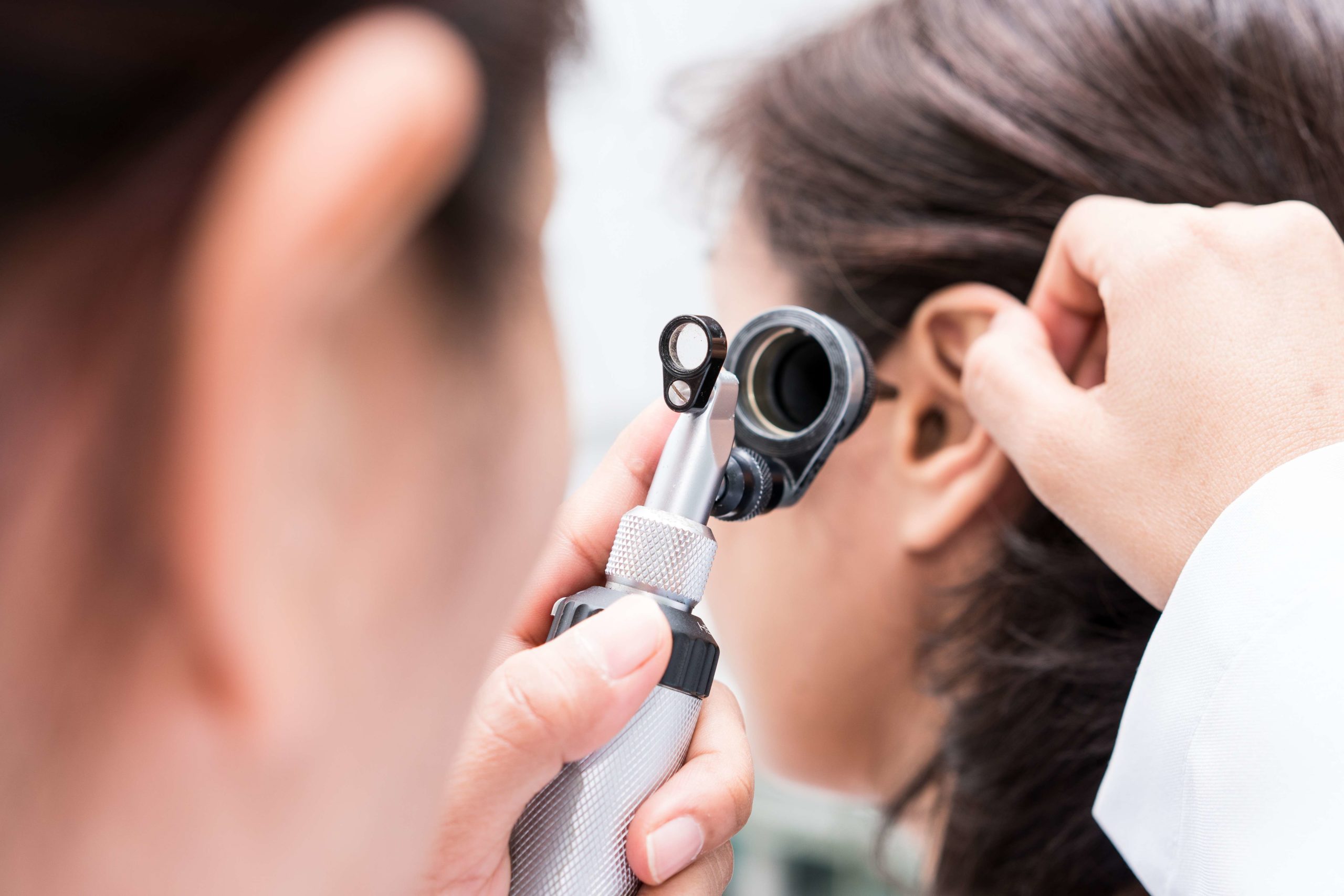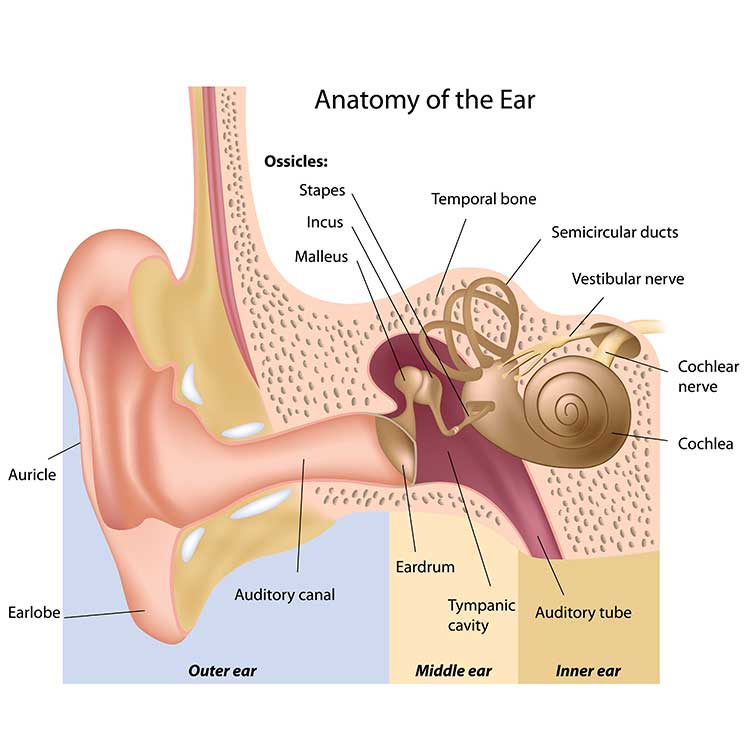This website uses cookies so that we can provide you with the best user experience possible. Cookie information is stored in your browser and performs functions such as recognising you when you return to our website and helping our team to understand which sections of the website you find most interesting and useful.
Hearing Loss

Hearing loss affects people of all age groups, and if left untreated, it can affect your ability to understand speech. Hearing loss can also negatively impact your social and emotional well-being, decreasing your overall quality of life.
Incidence of Hearing Loss in the U.S.
Hearing loss is the third most common health problem in the United States (US). The National Institute on Deafness and Other Communication Disorders (NIDCD) studies show some alarming numbers:
- Close to 37.5 million American adults (15% of the population) aged 18 and over have experienced some form of hearing impairment.
- Of every 1000 children born in the US, 2 to 3 children are born with detectable levels of hearing loss in one or both ears.
- One in eight people in the US (about 30 million) aged 12 years or older has hearing loss in both ears.
- About 18 percent of adults aged 20-69 have speech-frequency hearing loss in both ears from five years or more of work-related exposure to very loud noise.
- Among adults in the 20 to 69 year age bracket, men are almost twice as likely as women to have hearing loss.
Factors That Cause Hearing Loss
Age is not the only factor that causes hearing-related problems among adults. Hearing loss can also be due to:
- Side effects from medication
- Tumors affecting auditory capabilities
- Heart conditions or stroke
- Infection of the ear
- Exposure to extreme noise for work or leisure
- Inherited genetic susceptibility
- Head trauma caused by accidents
Degrees of Hearing Loss
The volume or intensity of sound is measured in Decibels (dB). Normal hearing thresholds are gauged between 0 and 25 dB. People who cannot hear clearly at normal thresholds are said to be suffering from hearing problems. The extent of hearing loss is described by varying degrees, not percentages. Hearing loss may be mild, moderate, moderately severe, severe, or profound, and it can vary across pitches.
People who are said to be hard of hearing tend to experience mild to severe levels of hearing loss, which can be treated with hearing aids and cochlear implants, etc. On the other hand, those with a profound level of hearing loss are said to be experiencing deafness and generally need to use sign language to communicate.
Anatomy of the Ear

The mechanics of the human ear are split between three parts: the outer ear, middle ear, and inner ear. Normal human hearing is achieved when sound waves traveling through air are converted to electrochemical signals in the ear and sent to the brain. The sound waves enter the body through the outer ear and reach the eardrum through the auditory canal (ear canal). Vibrations of the eardrum are then amplified by the bones in the middle ear and forwarded to the cochlea in the inner ear. Chemical reactions within the inner ear then convert the vibrations into electrical signals for the brain to recognize.
Types of Hearing Loss
The type of hearing loss experienced by an individual differs based on what part of the ear is affected. There are four major types of hearing loss:
- Conductive hearing loss
- Sensorineural hearing loss
- Mixed hearing loss
- Neural hearing loss
Conductive Hearing Loss
This type of hearing loss occurs when sound is not properly conducted or directed to the cochlea in the inner ear. Conductive hearing loss is usually caused by problems in the auditory canal, eardrum (tympanic membrane), or the middle ear (ossicles and auditory tube). The inner ear is not affected by this type of hearing loss.
The symptoms of conductive hearing loss include:
- Sounds are muffled
- Sounds are very low or quiet
Conductive hearing loss can be caused by:
- History of outer or middle ear infections
- Blockage due to earwax
- Weakening of the middle ear bones (ossicles)
- Otosclerosis (middle ear bone gets stuck in place)
- Perforated tympanic membrane (tear in the eardrum)
- Absence of the outer ear or middle ear structures
Conductive hearing loss can be temporary or permanent, depending on what caused the problem. It is possible to correct some cases through medical intervention, but more permanent or long-standing cases may require hearing aids or devices designed to amplify sound.
Sensorineural Hearing Loss
Sensorineural hearing loss occurs when there is a problem with the sensory receptors of the hearing system, specifically in the cochlea of the inner ear. The majority of cases occur due to an abnormality or damage to the hair cells in the cochlea. This abnormality prevents sound from being transmitted to the brain normally, which results in hearing loss.
The symptoms of sensorineural hearing loss include:
- Muffled speech
- Ringing in the ears (tinnitus)
- Difficulty hearing in background noise
- Feeling that others do not speak clearly
Sensorineural hearing loss can be caused by:
- Congenital defect. Hair cells in the inner ear have been abnormal since birth.
- Damage to hair cells. Hair cells in the inner ear are damaged due to genetics, infection, drugs, trauma, or over-exposure to noise.
- Presbycusis (pres-be-cue-sis). Hair cells are damaged as a result of the aging process.
People with sensorineural hearing loss need to get their hearing checked regularly to monitor the hearing loss. This type of hearing loss is generally permanent and may stay stable or worsen over time. Hearing aids or cochlear implants are usually recommended for those experiencing sensorineural hearing loss.
Mixed Hearing Loss
Mixed hearing loss occurs when a person has problems in the inner ear and the outer and/or middle ear. Mixed hearing loss arises when a person experiences aspects of sensorineural hearing loss and conductive hearing loss. In other words, the out ear is unable to conduct sound waves to the inner ear, while the inner ear is not able to convert it properly into signals for the brain.
Conductive hearing loss may be temporary or permanent, depending on the source of the problem. Sensorineural hearing loss, however, is likely to be permanent. In some cases, mixed hearing loss can be treated with medical intervention and with hearing aids.
The symptoms and causes of mixed hearing loss are similar to those of conductive hearing loss and sensorineural hearing loss.
Neural Hearing Loss
Neural hearing loss occurs when the auditory nerve that carries signals from the cochlea to the brain is missing or abnormal. Depending on the severity of the damage to the auditory nerve, amplification may be recommended to treat neural hearing loss. This type of hearing loss is generally difficult to diagnose because the exact location of the problem is not always apparent.
Individuals with neural hearing loss have trouble understanding speech, even when it is loud enough, especially in background noise.
Neural hearing loss can be caused by:
- Genetics
- Acoustic tumors
- In-utero exposure to certain infections
- Severe jaundice in infancy
- Low birth weight due to premature birth
Importance of Timely Treatment
The myth that hearing loss only affects older people has resulted in stigma around early recognition of hearing-related concerns. Most people ignore hearing loss as unimportant or view it as an indicator of aging and avoid accepting it as a problem until it becomes a chronic situation. Or you have other patients that have been diagnosed with a hearing deficit but wait to seek treatment for almost 7 years.
Untreated hearing loss can have a severe impact on your overall health. Studies have revealed that an undiagnosed or untreated hearing ailment can cause psychological problems like anger, stress, depression, and a tendency to withdraw from social engagements, leading to loneliness. Untreated hearing loss can also reduce alertness, increase personal safety risk, and affect job performance and earning power.
Furthermore, auditory health is closely related to cardiovascular health, so any damage to the auditory system can be directly linked to some or all of the following problems:
- Reduced spatial awareness
- Increased risk of falls and injuries due to loss of balance
Perhaps most worrying of all, reduced hearing capability means the brain receives far less stimulation than before. The brain is a muscle just like any other muscle in the body. It needs constant stimulus to remain active and healthy. When the brain that registers sound is no longer active, it can lead to a reduced ability to make memories. If left untreated, problems of memory loss and even dementia become more likely among people with hearing impairment.
NIDCD Hearing Test
Take the NIDCD hearing test developed for adults ages 18 to 64 to learn more about your hearing health. There are 10 quick questions to help you determine if you should see an audiologist about your hearing concerns.
Hearing Loss Evaluation at Advanced Audiology Care
If you suspect you have hearing loss and would like to schedule a hearing test for yourself or a family member, contact Advanced Audiology Care at (848) 231-6637. Alternatively, you can request an appointment online. Dr. Fan will identify and measure the type and degree of hearing loss and recommend treatment options that best fit your needs and lifestyle.


